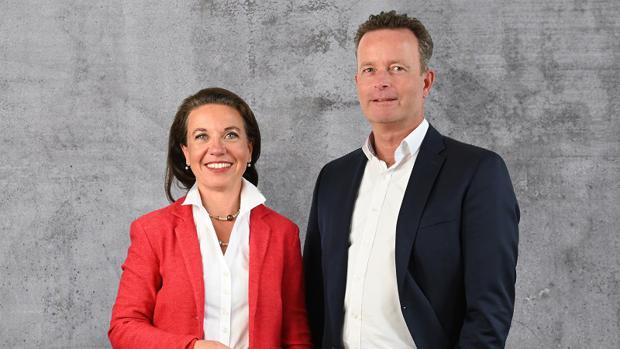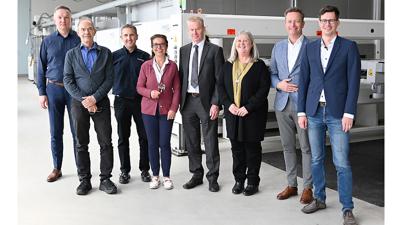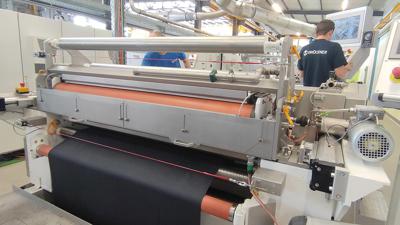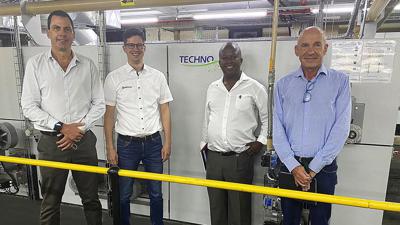melliand International 5/2022

Regina Brückner & Axel Pieper, Managing Associates, Brückner Trockentechnik GmbH (Source: Brückner)
The focus of our German and European customers is currently very much on energy costs, as these have risen more sharply than ever before in recent weeks. Added to this is the not inconsiderable challenge of energy bottlenecks and with it the concern that there could be a general de-industrialization in Germany, possibly even an exodus of the European textile industry. But how do we deal with this as citizens, as responsible entrepreneurs and as part of this industry?
In the short term, the cost of primary energy has risen extremely. Now, a gas price cap is being introduced to keep the impact on private households and companies in check. Compared with other producing countries, the cost of primary energy is far above the international benchmark, and this is compounded by significantly higher labor costs. Both these factors mean that the cost price of textile products in Europe is significantly higher than in Asia, South America, or Turkey. However, logistics costs from these countries to Europe have also risen sharply. In addition, high logistics costs also always mean high CO2 consumption – and this, too, has to be reduced in times of the Green Deal.
As a mechanical engineering company, however, we have the impression that German textile manufacturers in particular have done a lot in recent years to optimize their processes, especially to reduce energy consumption. We are registering great interest worldwide in converting existing machines to electric heating, investing in heat recovery or in other forms of energy saving. This is not only cost saving in the long run, but also a way to reduce the CO2 footprint as soon as sufficient green energy is available. For almost all existing plants, such a conversion is possible after a thorough assessment. Most plants can then continue to operate as hybrid machines, i.e. they use gas/oil/steam as before, and can be heated with electricity as an alternative or backup.
As a mechanical engineering company, however, we have the impression that German textile manufacturers in particular have done a lot in recent years to optimize their processes, especially to reduce energy consumption. We are registering great interest worldwide in converting existing machines to electric heating, investing in heat recovery or in other forms of energy saving. This is not only cost saving in the long run, but also a way to reduce the CO2 footprint as soon as sufficient green energy is available. For almost all existing plants, such a conversion is possible after a thorough assessment. Most plants can then continue to operate as hybrid machines, i.e. they use gas/oil/steam as before, and can be heated with electricity as an alternative or backup.
As a medium-sized company we are used to thinking in the long term. The strong fluctuations in orders in the textile industry are not too much of a surprise either for most machinery manufacturers or for our customers. We work in partnership with our customers and think in the long term, because in addition to the costs, it is always about the experience and expertise that we offer our customers, or they offer their customers and end-users. As a rule, this know-how cannot be transferred to other markets and production sites at short notice.
As a partner for our customers, we increasingly offer technological consultation to optimize processes in finishing, especially to reduce costs. However, we urgently recommend that this optimization is carried out across the board, because far too often in our industry people still think in too limited a way. They are hesitant to start comprehensive optimization approaches because they are worried that some processes will then need to be newly certified. Perhaps there is also a fear of change, because the requirements are not known well enough, and it is preferential to work in familiar ways. But when, if not now, will the opportunity occur to implement new methods, alternative processes and new recipes?
Often, regulatory requirements also need to be adapted, especially now that the framework conditions are changing on a daily basis. From an entrepreneurial point of view, we must particularly address the following points to the political decision-making bodies:
- The approval procedures for new plants/conversions/etc. must be shortened and simplified. The manufacturing industry, especially in Germany, but also in other EU countries, is a guarantor for good and secure jobs. However, citizens in the EU cannot live from services alone. Both the German machinery building and textile industries are global pioneers in terms of energy efficiency and innovation. We must maintain this status in the future.
- The Textile Strategy proclaimed by the EU is groundbreaking: however, it must be adhered to by all, including those who import textiles into the EU. The aim is to make textile production worldwide more sustainable, cleaner and more efficient, and we must all work on this for the sake of future generations.
The textile industry has been growing for years due to the increasing number of people and rising prosperity. In the EU, the growth of the past is based mainly on new areas of application, especially in the field of technical textiles. Textiles are lighter and cheaper than many other materials, without textiles our life would be less colorful, less cozy, less comfortable and much louder. We should therefore use and appreciate the advantages of the material, even if the costs for it increase slightly. However, above all we also need training, research and jobs in the field of textile production in Germany and Europe in the future!
We therefore foresee a positive future of textile production and look forward to new ideas and developments that we can tackle with our customers – especially now!!!
Regina Brückner & Axel Pieper
Managing Associates
Brückner Trockentechnik GmbH & Co. KG
Leonberg/Germany
Managing Associates
Brückner Trockentechnik GmbH & Co. KG
Leonberg/Germany



